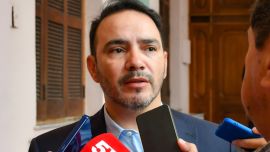The Javier Milei Presidency has never been short of contradictions but perhaps last Monday qualifies as a supreme example. The global conference of the Milken Institute arguably trumps Davos as the ultimate capitalist huddle (not least because of its founder’s name, junk bond king Michael Milken, since even if it was his partner Ivan Boesky who actually said: “Greed is good,” Milken remains an icon of Wall Street speculation) and Milei was entirely true to its spirit, accompanying a fervid defence of capitalism with a presentation of Argentina as a magnet of “enormous” investment opportunities as “the 21st century Rome” and “the Mecca of the West.” Yet whither those enormous investment opportunities if back home the government could extend the PAIS tax (the Spanish acronym for a levy with the ultra-Kirchnerite label of “For an Argentina of Inclusion and Solidarity,” introduced in the very first week of the Frente de Todos Presidency) to the purchase of currency so that foreign companies may repatriate their dividends? A prime example of the need to look at what governments do rather than at what their presidents (or Elon Musk for that matter) say.
The economic team would doubtless spring to justify this contradiction with Milei’s libertarian rhetoric by pointing out that a balanced budget is a more immediate priority than overseas investment but foreign currency being far more automatically released for bond payments than for private-sector dividends might be a further indication of the priorities of Economy Minister Luis Caputo – a financial trader by background rather than an economist, far closer to the world of Milken than to the productive sector. The government is at least moving to release dividends trapped in this country by capital controls for almost five years but if the PAIS tax (raised to 17.5 percent by this libertarian government from the 7.5 percent of its Kirchnerite creators) is added to corporate taxation of 35 percent and other levies, the total tops 60 percent – beyond Scandinavian levels.
Since the saving and investment rates of countries are almost perfectly correlated, the government is not doing much to encourage investment on the home front either by offering savers constantly negative interest rates, dropping them 10 percent every time inflation dips a couple of points. Nor is the greenback the eternal safeguard with the sharpest loss of value within the current exchange rate disarray – a creeping devaluation of two percent as against interest rates now down to a monthly five percent or so and inflation slowly entering single digits. It is true that pegging interest rates ahead of inflation only snowballs into a vicious circle but while they remain positive against the dollar, it will surely be more difficult to lift capital controls.
Even such an ultra-capitalist forum as the Milken Institute’s global conference must have been puzzled by Milei’s self-definition as an anarcho-capitalist since historically capitalism could never emerge until a rules-based society had replaced feudal chaos and royal absolutism. These are not Milei’s only contradictions and nor are these limited to his economic policies or philosophy – without entering into any details here, his constant compulsion to insult critics and journalists mark him out as an oxymoron of liberal intolerance.
Milei might take refuge in the famous lines of Walt Whitman: “Do I contradict myself? Very well, then I contradict myself, I am large, I contain multitudes,” taking it to a new level of meaning beyond the multiple personalities and choices within each individual because besides the variations within his inner self, he actually represents multitudes – both formally and in real terms if opinion polls are any guide. Indeed Milei is probably inclined to believe that he owes the loyalty of multitudes precisely to his contradictions and insults. Yet if Whitman defined himself by his contradictions, the Spanish philosopher José Ortega y Gasset offered a different self-definition of “myself and my circumstances.” Should Milei look at the context in which he was elected, he might be a walking contradiction spewing insults but his circumstances were a frustrated society taking a chance with a feeling of nothing to lose – his mandate was to restore order with a more normal set of socio-economic rules, not the reverse by playing the libertarian eccentric.
But, as stated at the start, governments should not be judged by what they say but by what they do – perhaps we should be more worried about the latter not matching expectations.


















Comments